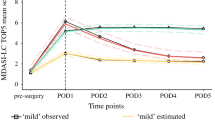Abstract
Background
We prospectively evaluated surgeons’ ability to predict outcomes of life expectancy and symptom relief following major surgery for patients with advanced malignancies.
Methods
Fifty-seven patients with advanced malignancies were evaluated regarding major symptoms requiring a surgical intervention and followed until death or last contact. The patients’ surgeons answered questions preoperatively and postoperatively, relating to issues such as estimated survival time and likelihood of symptom relief following surgery. We compared these estimates with patients’ clinical outcomes and responses to a symptom questionnaire completed just prior to surgery, and 2 weeks, 6 weeks, and 3 months following surgery.
Results
Surgeons’ preoperative estimates of patient survival agreed with survival outcomes. Preoperatively, surgeons accurately identified cases where a patient was expected to live less than 1 year without surgery (P < 0.0001) and with surgery (P = 0.0342). Surgeons’ preoperative estimates of the success of symptom improvement following surgery did not correlate in general with patients’ self-assessments (P = 0.6454). Specifically, surgeons underestimated their success in symptom resolution. However, there were statistically significant differences between patients who were judged by surgeons postoperatively to have mild or no palliation compared with those with excellent (P = 0.0372) and good (P = 0.0203) palliation.
Conclusion
Preoperatively, surgeons accurately estimated patients’ survival time with surgery. Surgeons’ postoperative estimates of success of symptom relief agreed with patients’ self-assessments. Preoperatively, surgeons tended to underestimate their patients’ symptom relief. Surgeons may wish to consider other criteria than their predictions for symptom relief in deciding whether a patient is a candidate for palliative surgery.


Similar content being viewed by others

References
Markus PM, Martell J, Leister I et al. Predicting postoperative morbidity by clinical assessment. Br J Surg 2005;92:101–6
Hartley MN, Sagar PM. The surgeon’s ‘gut feeling’ as a predictor of post-operative outcome. Ann R Coll Surg Engl 1994;76:277–8
McCahill LE, Smith DD, Borneman T et al. A prospective evaluation of palliative outcomes for surgery of advanced malignancies. Ann Surg Oncol 2003;10:654–63
Portenoy RK, Thaler HT, Kornblith AB et al. The Memorial Symptom Assessment Scale: an instrument for the evaluation of symptom prevalence, characteristics and distress. Eur J Cancer 1994;30A:1326–36
Krouse RS, Nelson RA, Farrell BR et al. Surgical palliation at a cancer center: incidence and outcomes. Arch Surg 2001;136:773–8
McCahill LE, Krouse R, Chu D et al. Indications and use of palliative surgery-results of Society of Surgical Oncology survey. Ann Surg Oncol 2002;9:104–12
McCahill LE, Krouse RS, Chu DZ et al. Decision making in palliative surgery. J Am Coll Surg 2002;195:411–22; discussion 422–3
Miner TJ, Jaques DP, Shriver CD. A prospective evaluation of patients undergoing surgery for the palliation of an advanced malignancy. Ann Surg Oncol 2002;9:696–703
Rosen SA, Buell JF, Yoshida A, et al. Initial presentation with stage IV colorectal cancer: how aggressive should we be? Arch Surg 2000;135:530–4; discussion 534–5
Joffe J, Gordon PH. Palliative resection for colorectal carcinoma. Dis Colon Rectum 1981;24:355–60
Makela J, Haukipuro K, Laitinen S et al. Palliative operations for colorectal cancer. Dis Colon Rectum 1990;33:846–50
Popiela T, Kedra B, Sierzega M et al. [Surgical palliation for pancreatic cancer. The 25-year experience of a single reference centre]. Zentralbl Chir 2002;127:965–70
Bonenkamp JJ, Sasako M, Hermans J et al. Tumor load and surgical palliation in gastric cancer. Hepatogastroenterology 2001;48:1219–21
Miner TJ. Palliative surgery for advanced cancer: lessons learned in patient selection and outcome assessment. Am J Clin Oncol 2005;28:411–4
Podnos YD, Juarez G, Pameijer C et al. Impact of surgical palliation on quality of life in patients with advanced malignancy: results of the decisions and outcomes in palliative surgery (DOPS) trial. Ann Surg Oncol 2007;14:922–8
Wagman LD. Palliative surgical oncology. Surg Oncol Clin North Am 2004;13:XIII-XIV
Wagman LD. Progress in palliative surgery—is it a subspecialty? J Surg Oncol 2007;96:449–50
Acknowledgment
The authors are grateful to the American Cancer Society for supporting this study through a research grant.
Author information
Authors and Affiliations
Corresponding author
Rights and permissions
About this article
Cite this article
Smith, D.D., McCahill, L.E. Predicting Life Expectancy and Symptom Relief Following Surgery for Advanced Malignancy. Ann Surg Oncol 15, 3335–3341 (2008). https://doi.org/10.1245/s10434-008-0162-1
Received:
Revised:
Accepted:
Published:
Issue Date:
DOI: https://doi.org/10.1245/s10434-008-0162-1


